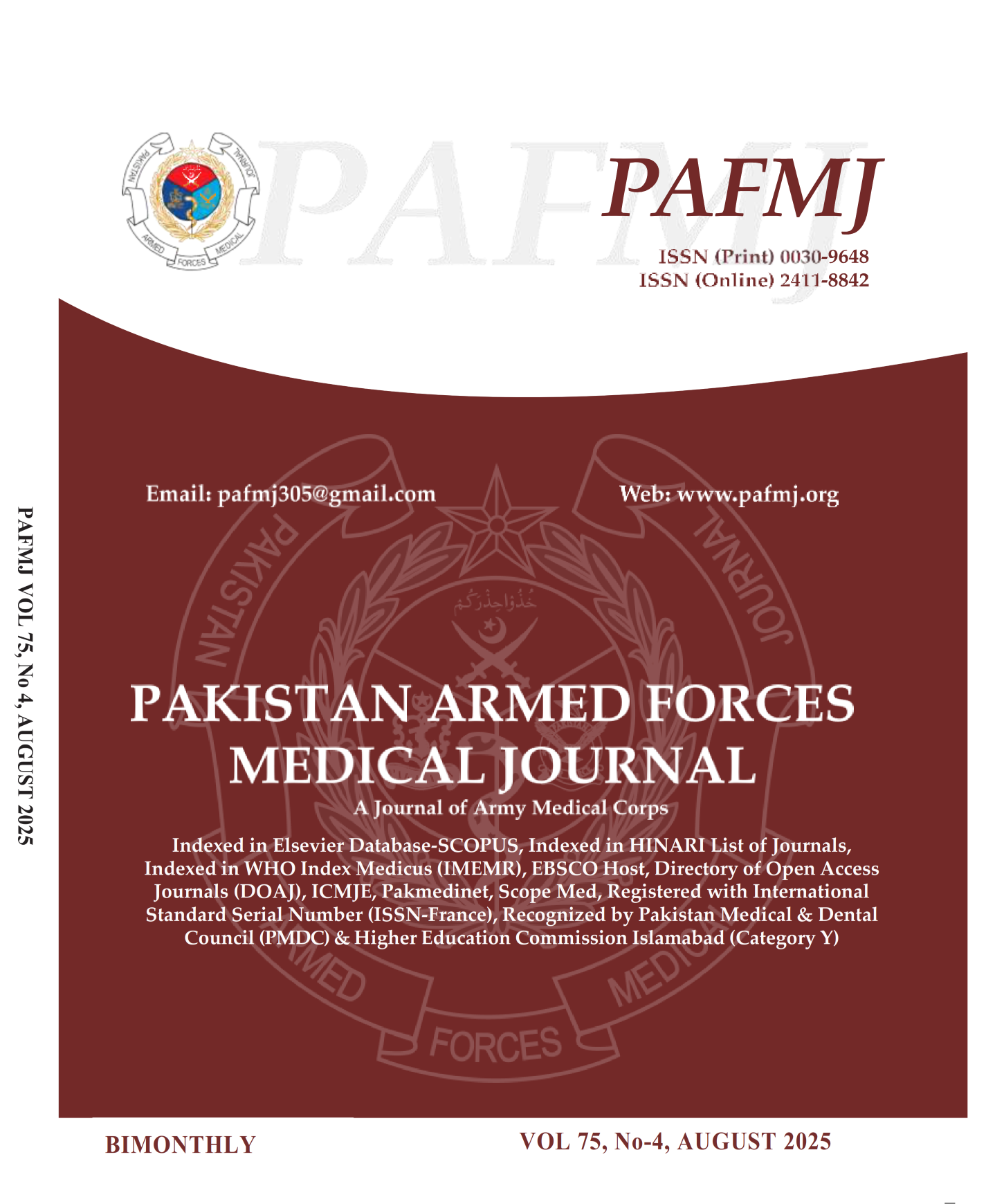Efficacy of Progressive Muscle Relaxation in Reducing Psychological Distress and Improving Quality of Life Among Nursing Students: A Feasibility Trial from Pakistan
DOI:
https://doi.org/10.51253/pafmj.v75i4.13357Keywords:
Anxiety, Depression, Mental Health, Nursing Students, Progressive Muscle RelaxationAbstract
Objective: To assess the level of psychological distress and evaluate the efficacy of Progressive Muscle Relaxation on psychological distress (stress, depression, anxiety) and quality of life among nursing students.
Study Design: Mixed-methods Study.
Place and Duration of Study: College of Nursing, Armed Forces Post Graduate Medical Institute, Rawalpindi Pakistan, from Jun to Aug 2024.
Methodology: Phase I of the study includes the assessment of psychological distress, in which a total of 28 nursing students reported significant psychological distress based on the Depression Anxiety Stress Scale (DASS-21) and participated in testing the efficacy of PMR intervention. In phase II, a single session of PMR was used along with pre- and post-testing for study variables through DASS21, the World Health Organization Quality of Life Scale (WHOQOL-BREF), and a Demographic Information sheet (DIS) in a group setting.
Result: We present initial evidence of the intervention's fidelity, with good inter-rater reliability (r=0.80), high acceptability through qualitative feedback analysis, and the feasibility of running a randomized controlled trial. Further, results revealed that after the intervention, depression scores significantly reduced with a moderate effect size (Cohen’s d=0.314). Qualitative assessment from acceptability feedback interviews complemented the findings.
Conclusions: We support using PMR intervention to manage psychological distress and enhance the quality of life among nursing students in Pakistan.
Downloads
References
1. Shdaifat EA, Jamama A, Sulieman MA. Predictors of stress and coping strategies among Jordanian nursing students. J Nurs Res 2018; 26(6), 402-408.
https://doi.org/10.5539/gjhs.v10n5p33
2. Pulido‐Martos M, Augusto‐Landa JM, Lopez‐Zafra E. Sources of stress in nursing students: a systematic review of quantitative studies. Int. Nurs Rev 2012; 59(1): 15-25.
https://doi.org/10.1111/j.1466-7657.2011.00939.x
3. Gao YQ, Pan BC, Sun W, Wu H, Wang JN, Wang L. Anxiety symptoms among Chinese nurses and the associated factors: a cross sectional study. BMC Psychiatry 2012; 12: 1-9.
https://doi.org/10.1186/1471-244X-12-141
4. Nabirye AK, Munabi IG, Mubuuke AG, Kiguli S. Emotional and Psychological Experiences of Nursing students caring for Dying Patients: A phenomenology study at Mulago National Hospital, Uganda. Research Square. 2024; 3: 4323878.
https://doi.org/10.21203/rs.3.rs-4323878/v1
5. Toussaint L, Nguyen QA, Roettger C, Dixon K, Offenbächer M, Kohls N, et al. Effectiveness of Progressive Muscle Relaxation, Deep Breathing, and Guided Imagery in Promoting Psychological and Physiological States of Relaxation. Evid Based Complement Alternat Med 2021; 2021: 5924040.
https://doi.org/10.1155/2021/5924040
6. Li M, Yang Y, Liu Y, Zhang L. Effects of progressive muscle relaxation on anxiety and depression in patients with COVID-19. J. Tradit. Chin. Med 2020; 7(4), 279-284.
https://doi.org/10.1016/j.jad.2020.06.033
7. Toussaint L, Nguyen QA, Roettger C, Dixon K, Offenbächer M, Kohls N, et al. Effectiveness of Progressive Muscle Relaxation, Deep Breathing, and Guided Imagery in Promoting Psychological and Physiological States of Relaxation. Evid Complement Alternat Med 2021; 5924040.
https://doi.org/10.1155/2021/5924040
8. Van der Riet P, Rossiter R, Kirby D, Dluzewska T, Harmon C. Piloting a stress management and mindfulness program for undergraduate nursing students: Student feedback and lessons learned. Nurse Educ Today 2015; 35(1): 44-49.
https://doi.org/10.1016/j.nedt.2014.05.003
9. Hassan, Mustafa. Progressive Muscle Relaxation Intervention Urdu Version. Psychological Research Wing during Mid-carrer Course. Nursing College Rawalpindi. June to August, Theis; 2024.
10. Moore SA, Avery L, Price CI, Flynn D. A feasibility, acceptability and fidelity study of a multifaceted behaviour change intervention targeting free-living physical activity and sedentary behaviour in community dwelling adult stroke survivors. Pilot Feasibil Stud 2020; 6: 1-3.
https://doi.org/10.1186/s40814-020-00603-3
11. Husain W, Gulzar A. Translation, adaptation and validation of Depression, Anxiety and Stress Scale in Urdu. Insigh Depress Anxiety 2020; 4: 001-004.
https://doi.org/ 10.29328/journal.ida.1001011
12. Whoqol Group. Development of the World Health Organization WHOQOL-BREF quality of life assessment. Psychol. Med 1998; 28(3): 551-558. https://doi.org/10.1017/S0033291798006667
13. Braun V, Clarke, V. Using Thematic Analysis in Psychology. Qualit Res Psychol 2006; 3(2), 77-101.
14. Sekhon M, Cartwright M, Francis JJ. Acceptability of healthcare interventions: An overview of reviews and development of a theoretical framework. BMC Health Serv Res 2017; 17: 88.
https://doi.org/10.1186/s12913-017-2031-8
15. Turner K, McCarthy VL. Stress and anxiety among nursing students: A review of intervention strategies in literature between 2009 and 2015. Nurse Educ Pract 2017; 22: 21. https://doi.org/10.1016/j.nepr.2016.11.002
16. Henry JD, Crawford JR. The short‐form version of the Depression Anxiety Stress Scales (DASS‐21): Construct validity and normative data in a large non‐clinical sample. Br J Clin Pharmacol 2005; 44(2): 227-2239.
https://doi.org/10.1348/014466505X29657
17. De Oliveira C, Saka M, Bone L, Jacobs R. The Role of Mental Health on Workplace Productivity: A Critical Review of the Literature. Appl Health Econ Health Policy 2023; 21(2): 167–193.
https://doi.org/10.1007/s40258-022-00761-w
18. Conrad A, Roth WT. Muscle relaxation therapy for anxiety disorders: it works but how?. J Affect Disord 2007; 21(3): 243-264. https://doi.org/10.1016/j.janxdis.2006.08.001
19. Jakobsen MD, Sundstrup E, Brandt M, Jay K, Aagaard P, Andersen LL. Physical exercise at the workplace reduces perceived physical exertion during healthcare work: cluster randomized controlled trial. J Public Health 2015; 43(7): 713-720.
https://doi.org/10.1177/1403494815590936
20. Khir SM, Yunus WMWA, Mahmud N, Wang R, Panatik SA, Sukor MSS, et al. Efficacy of Progressive Muscle Relaxation in Adults for Stress, Anxiety, and Depression: A Systematic Review. Psychol Res Behav Manag 2024; 17: 345–365.
https://doi.org/10.2147/PRBM.S437277
21. Hains AA, Szyjakowski M. A cognitive stress-reduction intervention program for adolescents. J Couns Psychol 1990; 37(1): 79.
https://doi.org/10.1037/0022-0167.37.1.79
22. Dolbier CL, Rush TE. Efficacy of abbreviated progressive muscle relaxation in a high-stress college sample. Int J Sports Med 2012; 19(1): 48. https://doi.org/10.1037/a0027326
23. Mustafa N, Farzeen M, Kiani S, Khan S, Ain N, Mumtaz. J. Comparison of Progressive Muscular Relaxation (PMR) and Music Therapy (MT) in Reducing the Anxiety, Depression and Stress Symptoms among Nurses. Pak Armed Forces Med J 2021; 71(6): 38. https://doi.org/10.51253/pafmj.v6i6.6338
Downloads
Published
License
Copyright (c) 2025 Shakeel Ahmed , Nazia Mustafa, Abid Aftab, Sophia Rashid Khan

This work is licensed under a Creative Commons Attribution-NonCommercial 4.0 International License.















